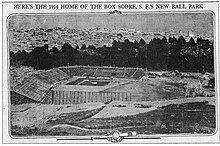Ewing Field was a baseball park in San Francisco, California. It served as the home of the San Francisco Seals of the Pacific Coast League for a single season, 1914.
Ewing Field was located in the Richmond District of the city, bounded by Masonic Avenue (east, third base); St. Rose's Avenue (now Anza Street, north, first base) and Geary Boulevard (a block north of St. Rose / Anza); Presentation Convent and Turk Boulevard (south, left field); and Lone Mountain (west, right field).

History

After several years at Recreation Park, Seals owner J. Cal Ewing was faced with some complex legal issues concerned with his ownership and his rental of Recreation Park. He decided to build a new ballpark in a part of the city that at the time had many cemeteries. [1]
After one season at the new park, and after enduring many complaints about the cold, windy, foggy weather at Ewing Field, [2] [3] [4] [5] [6] Ewing sold the team and the ballpark to Henry and Clarence Berry, who moved the club back to Recreation Park. [1]
The ballpark was subsequently used by local amateurs for football, soccer, rugby, and using a portable wooden ring that was stored under the stands, for boxing. During a game on June 5, 1926, the wooden structure caught fire from a cigarette, and soon burned down. Windblown embers set fire to approximately 100 houses. [1] With the ballpark fire raging out of control, the firemen concentrated their efforts on protecting the rest of the neighborhood, including the Presentation Convent behind the left field corner of the ballpark. [7] The left field bleachers avoided the fire due to a gap between them and the main grandstand.
The field continued to be used for football, with spectators using the bleachers. It was demolished in 1938 to construct a housing development called Ewing Terrace. [1] The internal looping street is also called Ewing Terrace.
Sources
- ^ a b c d Hartlaub, Peter (October 15, 2022). "How a forgotten San Francisco ballpark nearly destroyed the western half of the city". San Francisco Chronicle. Retrieved October 16, 2022.
- ^ Franks, Joel (2001). Whose baseball?: the national pastime and cultural diversity in California, 1859-1941. Issue 19 of American sports history series. Scarecrow Press. p. 216. ISBN 978-0-8108-3927-4. ISBN 0-8108-3927-X.
- ^ Gaar, Greg. "Ewing Field: Lost in the Fog Bank". Western Neighborhoods Project. Retrieved March 16, 2016.
- ^ Macfarlane, Angus. "Ewing Field: Better than Make-Believe, Part 1". Western Neighborhoods Project. Retrieved March 16, 2016.
- ^ Macfarlane, Angus. "Ewing Field: Better than Make-Believe, Part 2". Western Neighborhoods Project. Retrieved March 16, 2016.
- ^ MacFarlane, Angus. "Ewing Field". FoundSF. Retrieved March 16, 2016.
- ^ "The Story Of Ewing Field, NoPa's Doomed Stadium Of Yesteryear". Hoodline. Retrieved August 26, 2016.
Further reading
- Peter Filichia, Professional Baseball Franchises, Facts on File, 1993.
- Phil Lowry, Green Cathedrals, several editions.
- Michael Benson, Ballparks of North America, McFarland, 1989.
- Ewing Field and other Seals ballparks